2022届北京市部分区高三二模英语七选五汇编(含答案)
文档属性
| 名称 | 2022届北京市部分区高三二模英语七选五汇编(含答案) | 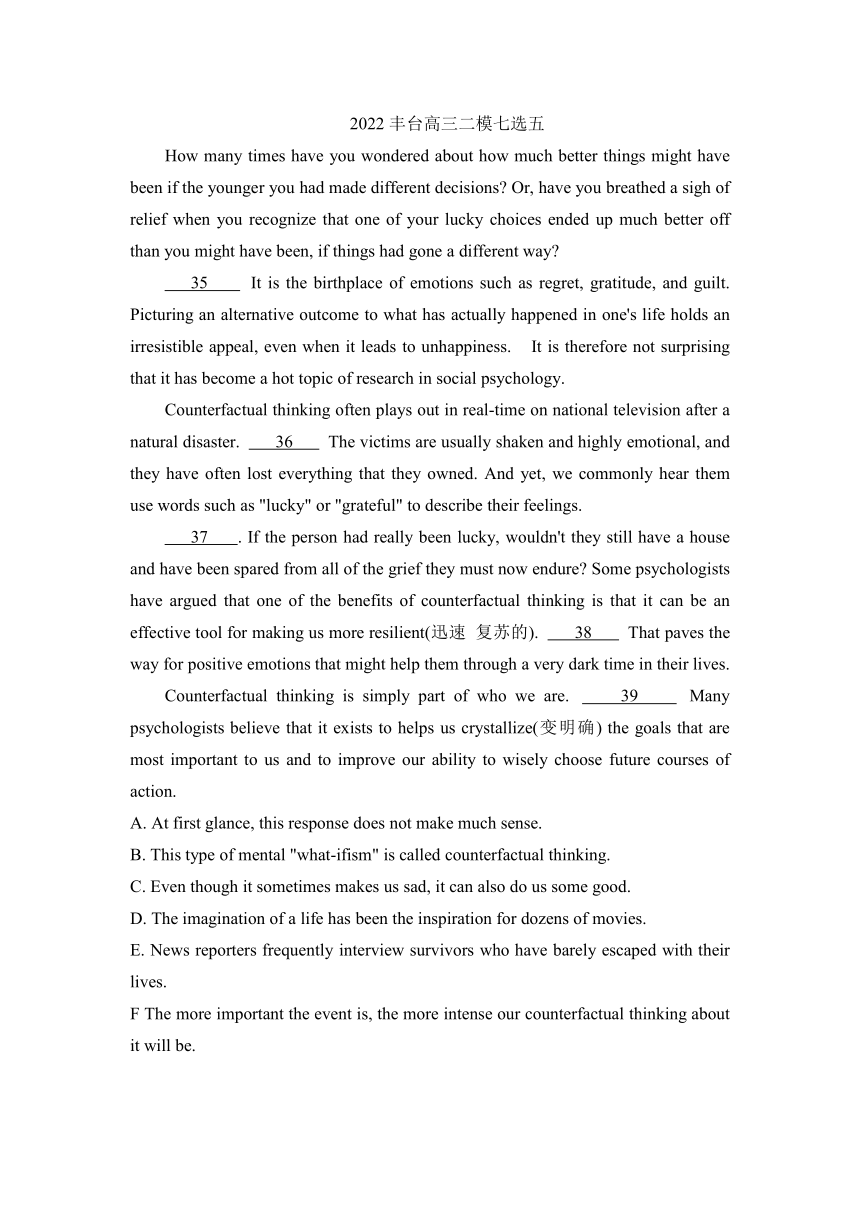 | |
| 格式 | doc | ||
| 文件大小 | 154.0KB | ||
| 资源类型 | 教案 | ||
| 版本资源 | 北师大版(2019) | ||
| 科目 | 英语 | ||
| 更新时间 | 2023-01-05 11:07:00 | ||
图片预览

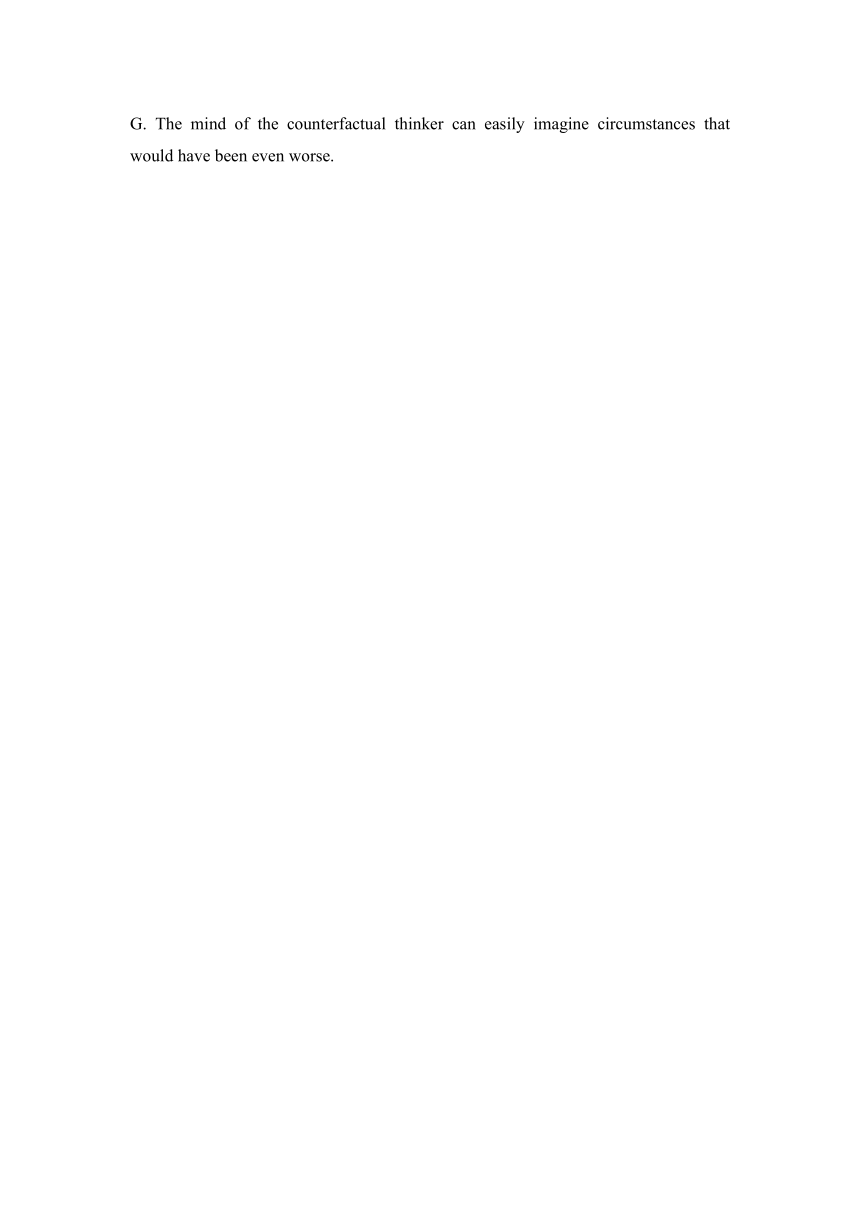
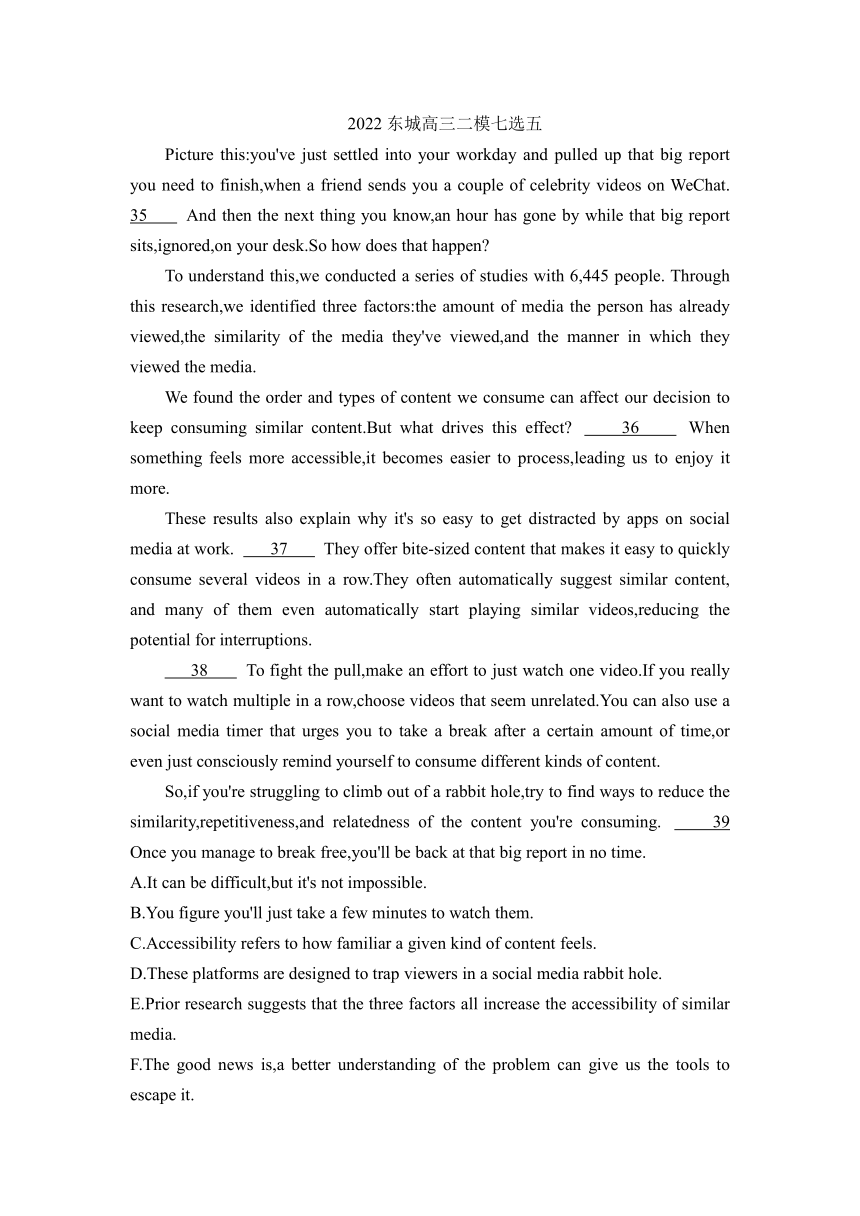
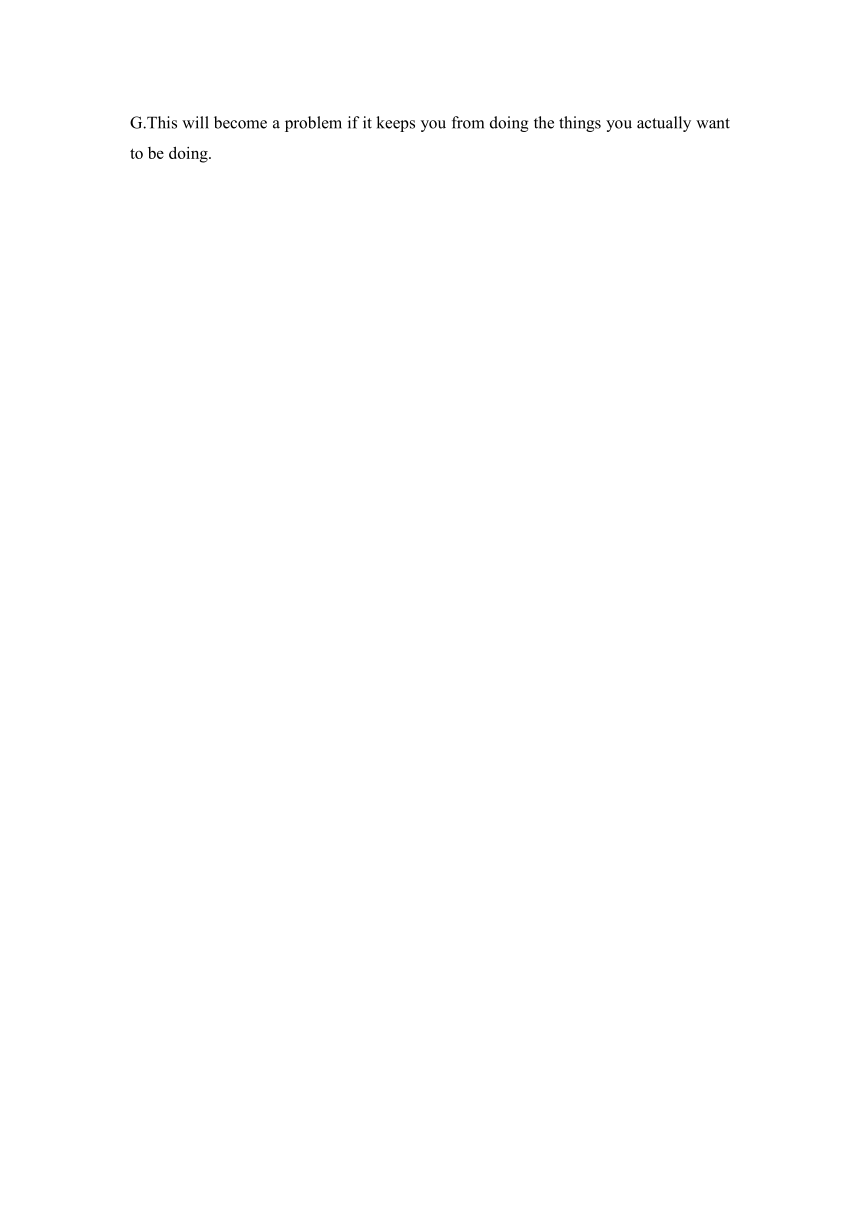
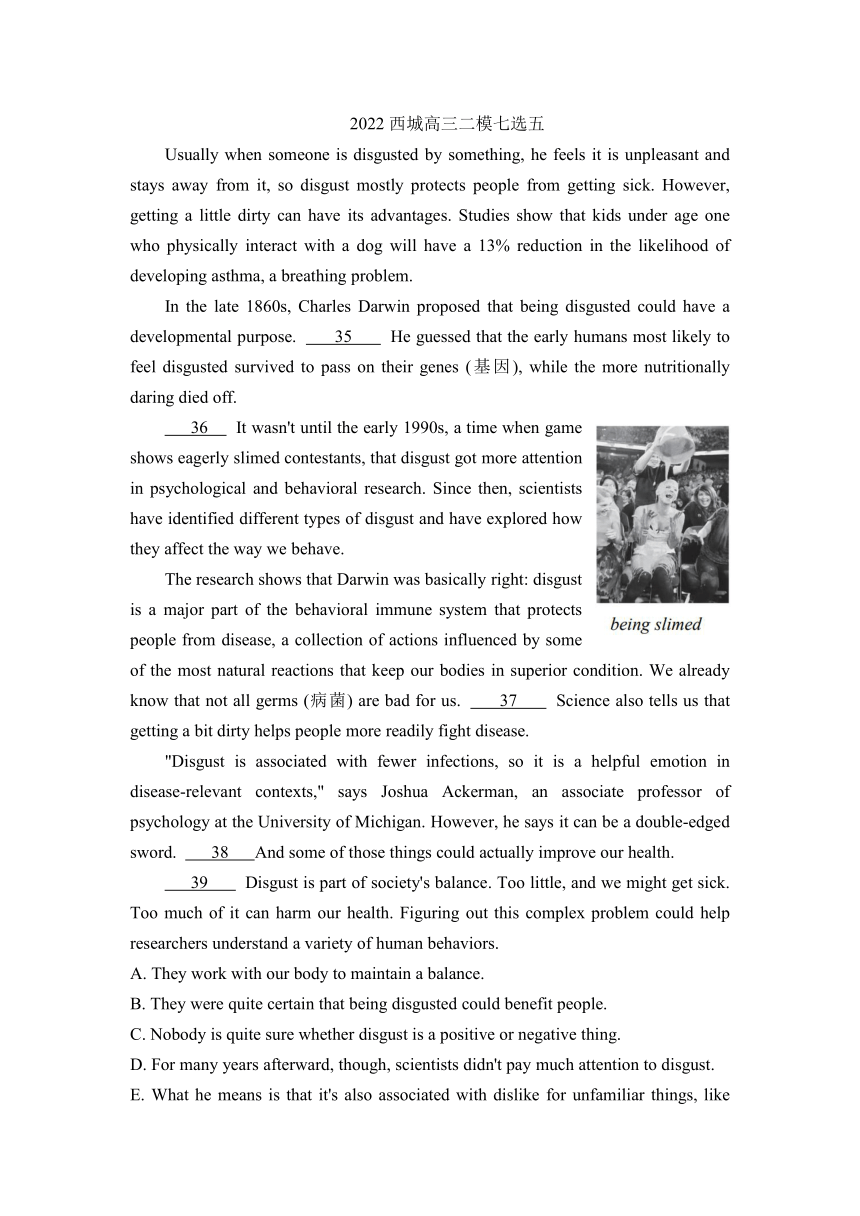
文档简介
2022丰台高三二模七选五
How many times have you wondered about how much better things might have been if the younger you had made different decisions Or, have you breathed a sigh of relief when you recognize that one of your lucky choices ended up much better off than you might have been, if things had gone a different way
35 It is the birthplace of emotions such as regret, gratitude, and guilt. Picturing an alternative outcome to what has actually happened in one's life holds an irresistible appeal, even when it leads to unhappiness. It is therefore not surprising that it has become a hot topic of research in social psychology.
Counterfactual thinking often plays out in real-time on national television after a natural disaster. 36 The victims are usually shaken and highly emotional, and they have often lost everything that they owned. And yet, we commonly hear them use words such as "lucky" or "grateful" to describe their feelings.
37 . If the person had really been lucky, wouldn't they still have a house and have been spared from all of the grief they must now endure Some psychologists have argued that one of the benefits of counterfactual thinking is that it can be an effective tool for making us more resilient(迅速 复苏的). 38 That paves the way for positive emotions that might help them through a very dark time in their lives.
Counterfactual thinking is simply part of who we are. 39 Many psychologists believe that it exists to helps us crystallize(变明确) the goals that are most important to us and to improve our ability to wisely choose future courses of action.
A. At first glance, this response does not make much sense.
B. This type of mental "what-ifism" is called counterfactual thinking.
C. Even though it sometimes makes us sad, it can also do us some good.
D. The imagination of a life has been the inspiration for dozens of movies.
E. News reporters frequently interview survivors who have barely escaped with their lives.
F The more important the event is, the more intense our counterfactual thinking about it will be.
G. The mind of the counterfactual thinker can easily imagine circumstances that would have been even worse.
2022东城高三二模七选五
Picture this:you've just settled into your workday and pulled up that big report you need to finish,when a friend sends you a couple of celebrity videos on WeChat. 35 And then the next thing you know,an hour has gone by while that big report sits,ignored,on your desk.So how does that happen
To understand this,we conducted a series of studies with 6,445 people. Through this research,we identified three factors:the amount of media the person has already viewed,the similarity of the media they've viewed,and the manner in which they viewed the media.
We found the order and types of content we consume can affect our decision to keep consuming similar content.But what drives this effect 36 When something feels more accessible,it becomes easier to process,leading us to enjoy it more.
These results also explain why it's so easy to get distracted by apps on social media at work. 37 They offer bite-sized content that makes it easy to quickly consume several videos in a row.They often automatically suggest similar content, and many of them even automatically start playing similar videos,reducing the potential for interruptions.
38 To fight the pull,make an effort to just watch one video.If you really want to watch multiple in a row,choose videos that seem unrelated.You can also use a social media timer that urges you to take a break after a certain amount of time,or even just consciously remind yourself to consume different kinds of content.
So,if you're struggling to climb out of a rabbit hole,try to find ways to reduce the similarity,repetitiveness,and relatedness of the content you're consuming. 39 Once you manage to break free,you'll be back at that big report in no time.
A.It can be difficult,but it's not impossible.
B.You figure you'll just take a few minutes to watch them.
C.Accessibility refers to how familiar a given kind of content feels.
D.These platforms are designed to trap viewers in a social media rabbit hole.
E.Prior research suggests that the three factors all increase the accessibility of similar media.
F.The good news is,a better understanding of the problem can give us the tools to escape it.
G.This will become a problem if it keeps you from doing the things you actually want to be doing.
2022西城高三二模七选五
Usually when someone is disgusted by something, he feels it is unpleasant and stays away from it, so disgust mostly protects people from getting sick. However, getting a little dirty can have its advantages. Studies show that kids under age one who physically interact with a dog will have a 13% reduction in the likelihood of developing asthma, a breathing problem.
In the late 1860s, Charles Darwin proposed that being disgusted could have a developmental purpose. 35 He guessed that the early humans most likely to feel disgusted survived to pass on their genes (基因), while the more nutritionally daring died off.
36 It wasn't until the early 1990s, a time when game shows eagerly slimed contestants, that disgust got more attention in psychological and behavioral research. Since then, scientists have identified different types of disgust and have explored how they affect the way we behave.
The research shows that Darwin was basically right: disgust is a major part of the behavioral immune system that protects people from disease, a collection of actions influenced by some of the most natural reactions that keep our bodies in superior condition. We already know that not all germs (病菌) are bad for us. 37 Science also tells us that getting a bit dirty helps people more readily fight disease.
"Disgust is associated with fewer infections, so it is a helpful emotion in disease-relevant contexts," says Joshua Ackerman, an associate professor of psychology at the University of Michigan. However, he says it can be a double-edged sword. 38 And some of those things could actually improve our health.
39 Disgust is part of society's balance. Too little, and we might get sick. Too much of it can harm our health. Figuring out this complex problem could help researchers understand a variety of human behaviors.
A. They work with our body to maintain a balance.
B. They were quite certain that being disgusted could benefit people.
C. Nobody is quite sure whether disgust is a positive or negative thing.
D. For many years afterward, though, scientists didn't pay much attention to disgust.
E. What he means is that it's also associated with dislike for unfamiliar things, like food.
F. Disgust became advanced to prevent our ancestors from eating spoiled food that might kill them.
G. Researchers across fields continue to explore disgust so we can better understand our world and ourselves.
2022朝阳六校七选五
People often discuss the dangers of too much stress, but lately a very different view of stress is gaining popularity. 35 The positive stress movement is made up of people such as Zachary Rapp who are looking for an edge in a competitive world. He wakes up at dawn, goes for a run, sips black coffee while ripping through emails, and then steps into a freezing cold shower. This is a routine designed to reduce the stress of running three different companies for 18 hours a day.
Although Rapp's practices may sound extreme, he is one of a group of followers of a growing movement. 36 Inspired by influential figures in different fields, including entertainers athletes, entrepreneurs and scientists, positive stress practitioners seek out some combination of extreme temperatures, restrictive diets, punishing exercise routines and general discomfort.
Rapp argues that positive stress keeps him balanced. In addition to running and freezing showers, Rapp uses ice baths, hot yoga, and unconventional eating practices such as eliminating dairy, sugar, and various other foods high in carbohydrates. He believes that these practices, which put stress on his body, actually make him feel less stress from work. 37 It was he himself that started using these methods in college, where he got into the habit of taking ice baths to recover from sports. He got back into it while trying to get his three companies off the ground.
Rapp works long hours and sleeps only five to seven hours a night but he said he only gets sick once a year. 38 .
One thought leader in the positive stress world is Dutch extreme athlete Wim Hof, who earned the name "ice man" for his ability to withstand severe cold using deep breathing exercises. Hof’s ideas have become popular among tech industry elites and, thanks to Hof, cold showers are now a trend. Indeed, some even call it a form of therapy.
39 Some medical professionals argue that positive stress is not for everyone, and that it might even be dangerous for people who are unhealthy or older.
A.Rapp's routine is a good example of followers of the movement.
B.This view of stress argues that stress might actually be beneficial.
C.However, Rapp does not credit anyone in particular for his choices.
D.But he thinks too much stress is harming his physical and mental health.
E.But it is important to note that not everyone agrees with these practitioners.
F.For him, positive stress involves pushing the body to extremes and forcing it to build up a tolerance.
G.It consists largely of tech industry workers who claim that such radical tactics will help them live better and longer.
2022昌平二模七选五
When we feel exhausted,our brains want to save mental energy by directing our focus to the most readily available, recallable information to help us make decisions quickly. We often do the thing that feels right,or rush to judgment without proper consideration. 35 It's the reason why if you speak Spanish,it's much easier to learn Italian than Japanese. It's also why many people think two single dollar bills are more valuable than a single two-dollar bill.
36 Or,we are willing to move toward things that make us feel good and away from things that make us feel uncomfortable.
Yet,we know hard actions can bring benefits-ones that may not be visible for some time. 37 Maybe we do this because we have an insight or a requirement from doctor. When we go for that initial run,it doesn't feel good. Neither does the run after that. Our muscles hurt. The money we've spent on the new hobby causes friction in our household. It continues to signal the reasons we should go back to the way it was before.
So,how do we do hard things when our brains are constantly telling us to avoid effort
● 38 A 2016 study found that when people are upset, they’re less likely to try to do hand things.When they're feeling upbeat,they're more likely to take on the hard-but-essential tasks that ultimately make life better.
● Give our brains the right amount of autonomy. When we have a choice,our brains often want something easy. 39
Doing things that feel uncomfortable and liking hard work can seem counterintuitive(反直觉的). But by understanding what’s going on in your brain,instead of depending on your first feeling,you can work toward completing hard things and manage your fears better.
A. Think about starting a new exercise routine.
B.Tackle hard things when we're in a good mood.
C.Accomplish hand things by having the supports of others.
D.The result is that many of us tend to do what simply feels right.
E.The brain does this because it's much easier to process existing ideas than new ones.
F.But there are still some people keeping with it to the end regardless of these difficulties.
G.But we can reduce that response by challenging ourselves to be innovative and provide motives.
2022丰台高三二模七选五答案
35. B 36. E 37. A 38. G 39. C
2022东城高三二模七选五答案
35. B 36. E 37. D 38. F 39. A
2022西城高三二模七选五答案
35. F 36. D 37. A 38. E 39. G
2022朝阳六校七选五答案
35. B 36. G 37. C 38. F 39. E
2022昌平高三二模七选五答案
35. E 36. D 37. A 38. B 39. G
How many times have you wondered about how much better things might have been if the younger you had made different decisions Or, have you breathed a sigh of relief when you recognize that one of your lucky choices ended up much better off than you might have been, if things had gone a different way
35 It is the birthplace of emotions such as regret, gratitude, and guilt. Picturing an alternative outcome to what has actually happened in one's life holds an irresistible appeal, even when it leads to unhappiness. It is therefore not surprising that it has become a hot topic of research in social psychology.
Counterfactual thinking often plays out in real-time on national television after a natural disaster. 36 The victims are usually shaken and highly emotional, and they have often lost everything that they owned. And yet, we commonly hear them use words such as "lucky" or "grateful" to describe their feelings.
37 . If the person had really been lucky, wouldn't they still have a house and have been spared from all of the grief they must now endure Some psychologists have argued that one of the benefits of counterfactual thinking is that it can be an effective tool for making us more resilient(迅速 复苏的). 38 That paves the way for positive emotions that might help them through a very dark time in their lives.
Counterfactual thinking is simply part of who we are. 39 Many psychologists believe that it exists to helps us crystallize(变明确) the goals that are most important to us and to improve our ability to wisely choose future courses of action.
A. At first glance, this response does not make much sense.
B. This type of mental "what-ifism" is called counterfactual thinking.
C. Even though it sometimes makes us sad, it can also do us some good.
D. The imagination of a life has been the inspiration for dozens of movies.
E. News reporters frequently interview survivors who have barely escaped with their lives.
F The more important the event is, the more intense our counterfactual thinking about it will be.
G. The mind of the counterfactual thinker can easily imagine circumstances that would have been even worse.
2022东城高三二模七选五
Picture this:you've just settled into your workday and pulled up that big report you need to finish,when a friend sends you a couple of celebrity videos on WeChat. 35 And then the next thing you know,an hour has gone by while that big report sits,ignored,on your desk.So how does that happen
To understand this,we conducted a series of studies with 6,445 people. Through this research,we identified three factors:the amount of media the person has already viewed,the similarity of the media they've viewed,and the manner in which they viewed the media.
We found the order and types of content we consume can affect our decision to keep consuming similar content.But what drives this effect 36 When something feels more accessible,it becomes easier to process,leading us to enjoy it more.
These results also explain why it's so easy to get distracted by apps on social media at work. 37 They offer bite-sized content that makes it easy to quickly consume several videos in a row.They often automatically suggest similar content, and many of them even automatically start playing similar videos,reducing the potential for interruptions.
38 To fight the pull,make an effort to just watch one video.If you really want to watch multiple in a row,choose videos that seem unrelated.You can also use a social media timer that urges you to take a break after a certain amount of time,or even just consciously remind yourself to consume different kinds of content.
So,if you're struggling to climb out of a rabbit hole,try to find ways to reduce the similarity,repetitiveness,and relatedness of the content you're consuming. 39 Once you manage to break free,you'll be back at that big report in no time.
A.It can be difficult,but it's not impossible.
B.You figure you'll just take a few minutes to watch them.
C.Accessibility refers to how familiar a given kind of content feels.
D.These platforms are designed to trap viewers in a social media rabbit hole.
E.Prior research suggests that the three factors all increase the accessibility of similar media.
F.The good news is,a better understanding of the problem can give us the tools to escape it.
G.This will become a problem if it keeps you from doing the things you actually want to be doing.
2022西城高三二模七选五
Usually when someone is disgusted by something, he feels it is unpleasant and stays away from it, so disgust mostly protects people from getting sick. However, getting a little dirty can have its advantages. Studies show that kids under age one who physically interact with a dog will have a 13% reduction in the likelihood of developing asthma, a breathing problem.
In the late 1860s, Charles Darwin proposed that being disgusted could have a developmental purpose. 35 He guessed that the early humans most likely to feel disgusted survived to pass on their genes (基因), while the more nutritionally daring died off.
36 It wasn't until the early 1990s, a time when game shows eagerly slimed contestants, that disgust got more attention in psychological and behavioral research. Since then, scientists have identified different types of disgust and have explored how they affect the way we behave.
The research shows that Darwin was basically right: disgust is a major part of the behavioral immune system that protects people from disease, a collection of actions influenced by some of the most natural reactions that keep our bodies in superior condition. We already know that not all germs (病菌) are bad for us. 37 Science also tells us that getting a bit dirty helps people more readily fight disease.
"Disgust is associated with fewer infections, so it is a helpful emotion in disease-relevant contexts," says Joshua Ackerman, an associate professor of psychology at the University of Michigan. However, he says it can be a double-edged sword. 38 And some of those things could actually improve our health.
39 Disgust is part of society's balance. Too little, and we might get sick. Too much of it can harm our health. Figuring out this complex problem could help researchers understand a variety of human behaviors.
A. They work with our body to maintain a balance.
B. They were quite certain that being disgusted could benefit people.
C. Nobody is quite sure whether disgust is a positive or negative thing.
D. For many years afterward, though, scientists didn't pay much attention to disgust.
E. What he means is that it's also associated with dislike for unfamiliar things, like food.
F. Disgust became advanced to prevent our ancestors from eating spoiled food that might kill them.
G. Researchers across fields continue to explore disgust so we can better understand our world and ourselves.
2022朝阳六校七选五
People often discuss the dangers of too much stress, but lately a very different view of stress is gaining popularity. 35 The positive stress movement is made up of people such as Zachary Rapp who are looking for an edge in a competitive world. He wakes up at dawn, goes for a run, sips black coffee while ripping through emails, and then steps into a freezing cold shower. This is a routine designed to reduce the stress of running three different companies for 18 hours a day.
Although Rapp's practices may sound extreme, he is one of a group of followers of a growing movement. 36 Inspired by influential figures in different fields, including entertainers athletes, entrepreneurs and scientists, positive stress practitioners seek out some combination of extreme temperatures, restrictive diets, punishing exercise routines and general discomfort.
Rapp argues that positive stress keeps him balanced. In addition to running and freezing showers, Rapp uses ice baths, hot yoga, and unconventional eating practices such as eliminating dairy, sugar, and various other foods high in carbohydrates. He believes that these practices, which put stress on his body, actually make him feel less stress from work. 37 It was he himself that started using these methods in college, where he got into the habit of taking ice baths to recover from sports. He got back into it while trying to get his three companies off the ground.
Rapp works long hours and sleeps only five to seven hours a night but he said he only gets sick once a year. 38 .
One thought leader in the positive stress world is Dutch extreme athlete Wim Hof, who earned the name "ice man" for his ability to withstand severe cold using deep breathing exercises. Hof’s ideas have become popular among tech industry elites and, thanks to Hof, cold showers are now a trend. Indeed, some even call it a form of therapy.
39 Some medical professionals argue that positive stress is not for everyone, and that it might even be dangerous for people who are unhealthy or older.
A.Rapp's routine is a good example of followers of the movement.
B.This view of stress argues that stress might actually be beneficial.
C.However, Rapp does not credit anyone in particular for his choices.
D.But he thinks too much stress is harming his physical and mental health.
E.But it is important to note that not everyone agrees with these practitioners.
F.For him, positive stress involves pushing the body to extremes and forcing it to build up a tolerance.
G.It consists largely of tech industry workers who claim that such radical tactics will help them live better and longer.
2022昌平二模七选五
When we feel exhausted,our brains want to save mental energy by directing our focus to the most readily available, recallable information to help us make decisions quickly. We often do the thing that feels right,or rush to judgment without proper consideration. 35 It's the reason why if you speak Spanish,it's much easier to learn Italian than Japanese. It's also why many people think two single dollar bills are more valuable than a single two-dollar bill.
36 Or,we are willing to move toward things that make us feel good and away from things that make us feel uncomfortable.
Yet,we know hard actions can bring benefits-ones that may not be visible for some time. 37 Maybe we do this because we have an insight or a requirement from doctor. When we go for that initial run,it doesn't feel good. Neither does the run after that. Our muscles hurt. The money we've spent on the new hobby causes friction in our household. It continues to signal the reasons we should go back to the way it was before.
So,how do we do hard things when our brains are constantly telling us to avoid effort
● 38 A 2016 study found that when people are upset, they’re less likely to try to do hand things.When they're feeling upbeat,they're more likely to take on the hard-but-essential tasks that ultimately make life better.
● Give our brains the right amount of autonomy. When we have a choice,our brains often want something easy. 39
Doing things that feel uncomfortable and liking hard work can seem counterintuitive(反直觉的). But by understanding what’s going on in your brain,instead of depending on your first feeling,you can work toward completing hard things and manage your fears better.
A. Think about starting a new exercise routine.
B.Tackle hard things when we're in a good mood.
C.Accomplish hand things by having the supports of others.
D.The result is that many of us tend to do what simply feels right.
E.The brain does this because it's much easier to process existing ideas than new ones.
F.But there are still some people keeping with it to the end regardless of these difficulties.
G.But we can reduce that response by challenging ourselves to be innovative and provide motives.
2022丰台高三二模七选五答案
35. B 36. E 37. A 38. G 39. C
2022东城高三二模七选五答案
35. B 36. E 37. D 38. F 39. A
2022西城高三二模七选五答案
35. F 36. D 37. A 38. E 39. G
2022朝阳六校七选五答案
35. B 36. G 37. C 38. F 39. E
2022昌平高三二模七选五答案
35. E 36. D 37. A 38. B 39. G
